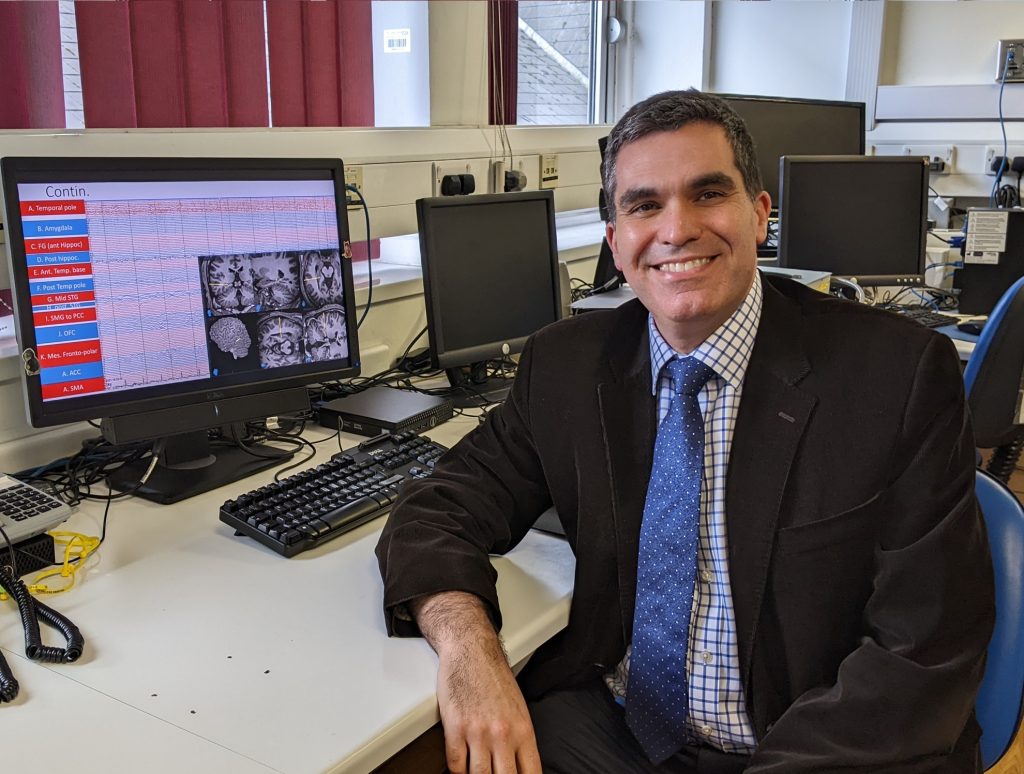Clinical trial using new device to treat children with epilepsy
05 July 2024 - A clinical trial using a new device to perform deep brain stimulation (DBS) on children with epilepsy has begun.

In collaboration, surgeons at Great Ormond Street Hospital (GOSH) mounted the new device, which was developed in the UK, to a 13-year-old patient’s skull, while King’s neurophysiologist Dr Antonio Valentín used electrodes to apply stimulation to the brain to reduce seizure activity. Since the procedure, the patient’s daytime seizures have decreased by 80%.
CADET (Children’s Adaptive Deep brain stimulation for Epilepsy Trial) is measuring the efficacy of the new device to carry out DBS – a treatment used for other neurological conditions such as Parkinson’s disease and dystonia – to treat children with Lennox-Gastaut syndrome (LGS), a rare form of epilepsy.
DBS involves surgically inserting a small device to stimulate specific parts of the brain. Similar procedures have taken place in children with refractory epilepsy at King’s with chest mounted devices, where implanted wires run up the neck to the brain. In the new pilot the new device is mounted on the skull where the leads are less likely to break or erode as the child grows.
The device targets the thalamus, which is a hub for electrical signals in the brain. It is hoped the device will block electrical pathways and consequently stop seizures from spreading. It is rechargeable through wearable headphones, which can be used while watching a video or interacting with a tablet, and does not require surgery to replace it every three to five years.
The pilot will now recruit three additional patients, before 22 patients take part in a further trial.
Dr Antonio Valentín, Honorary Medical (KCL) Neurophysiologist, said, “The aim of the trial is to test the device, and DBS as a procedure, to treat paediatric patients with LGS, a specific type of epilepsy. If the results are promising this treatment could lead to a marked improvement in the quality of life for the young patients affected with this devastating condition.”
Martin Tisdall, Consultant Paediatric Neurosurgeon at GOSH and Honorary Associate Professor at UCL, said: “Every single day we see the life-threatening and life-limiting impacts of uncontrollable epilepsy. It can make school, hobbies or even just watching a favourite TV show utterly impossible.
“Deep brain stimulation brings us closer than ever before to stopping epileptic seizures for patients who have very limited effective treatment options. We are excited to build the evidence base to demonstrate the ability of deep brain stimulation to treat paediatric epilepsy and hope in years to come it will be a standard treatment we can offer.”
King’s will be carrying out a trial case by the end of the year, with a further funding grant to treat another 22 cases (11 at King’s and 11 at GOSH) recently approved.
Professor Tim Denison, University of Oxford, who is the lead engineer said: “Our mission is to design pioneering research systems for exploring the treatment of intractable health conditions such as paediatric epilepsy. Oran is the first child in the world to receive this investigational device and we are extremely pleased that it has had such a positive benefit for him and his family.”
The CADET pilot is funded by the Royal Academy of Engineering and sponsored by University College London. It is a collaboration between GOSH, UCL Institute of Child Health, King’s College Hospital, King’s College London, the University of Oxford and a UK-based company: Amber Therapeutics.
